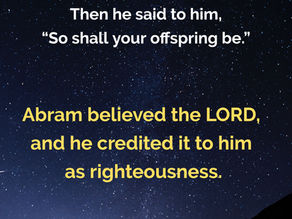Acts 2:22-24 - Powerful Providence
- Chad Werkhoven
- Apr 8, 2024
- 4 min read
Everything - both good & bad - is 'a God thing.'
Acts 2:22–24 (NIV)
CONTEXT: After be filled with the Holy Spirit, Peter has just begun preaching his famous Pentecost sermon.
22 “Fellow Israelites, listen to this: Jesus of Nazareth was a man accredited by God to you by miracles, wonders and signs, which God did among you through him, as you yourselves know. 23 This man was handed over to you by God’s deliberate plan and foreknowledge; and you, with the help of wicked men, put him to death by nailing him to the cross. 24 But God raised him from the dead, freeing him from the agony of death, because it was impossible for death to keep its hold on him.
Listen to passage & devotional:
Belgic Confession of Faith, Article 13: The Doctrine of God’s Providence
We believe that this good God,
after he created all things,
did not abandon them to chance or fortune
but leads and governs them
according to his holy will,
in such a way that nothing happens in this world
without his orderly arrangement.
Yet God is not the author of,
nor can he be charged with,
the sin that occurs.
For his power and goodness
are so great and incomprehensible
that he arranges and does his work very well and justly
even when the devils and wicked men act unjustly.
We do not wish to inquire
with undue curiosity
into what he does that surpasses human understanding
and is beyond our ability to comprehend.
But in all humility and reverence
we adore the just judgments of God,
which are hidden from us,
being content to be Christ’s disciples,
so as to learn only what he shows us in his Word,
without going beyond those limits.
This doctrine gives us unspeakable comfort
since it teaches us
that nothing can happen to us by chance
but only by the arrangement of our gracious
heavenly Father.
He watches over us with fatherly care,
keeping all creatures under his control,
so that not one of the hairs on our heads
(for they are all numbered)
nor even a little bird
can fall to the ground
without the will of our Father.
In this thought we rest,
knowing that he holds in check
the devils and all our enemies,
who cannot hurt us
without his permission and will.
For that reason we reject
the damnable error of the Epicureans,
who say that God involves himself in nothing
and leaves everything to chance.
Summary
People want to hear positive, encouraging messages when they come to church that build them up and make them feel better about themselves and their situation. At least that's what we as preachers are often told by the myriad of self appointed preaching gurus who produce popular articles, books and videos 'guaranteed' to result in explosive growth at any church who follows their advice.
Apparently Peter didn't get their materials, because one of the first things he does in his sermon is accuse the congregation of killing the very Savior God had sent for them. "You," Peter tells those assembled, "you, along with the help of wicked men, put Him to death by nailing Him to the cross." Not exactly positive and encouraging stuff here!
But perhaps the most shocking claim that Peter makes is about God. Jesus' ministry didn't end in an unexpected and unintended tragedy when He was nailed to the cross. No, Peter, inspired by the Holy Spirit, indicates that Jesus' gruesome death on a cross was the result of "God's deliberative plan and foreknowledge." In other words, God knew about, and was planning on, the events of Good Friday at the very same moment the angels filled the sky with songs on Christmas morning.
But God's deliberative plan and foreknowledge didn't come to an end with Jesus' final agonized breath. Peter makes clear in his sermon the primary message of the gospel: that "God raised Jesus from the dead, freeing Him from the agony of death, because it was impossible for death to keep its hold on Him."
Dig Deeper
It's so easy to associate the concept of God's providence with simply the provision of all of the good stuff in life: family, homes, food, jobs, and so on. Sometimes when some seemingly random thing happens that ends up preventing a big tragedy, we're quick to see God's hand in it; sometimes we even refer to it as 'a God thing.' These things certainly are the result of providence, and we ought to be thankful for it.
But Peter's sermon here tells us that everything that happens is the result of God's providence. Everything that occurs - good and bad - is a God thing. Even the most awful thing possible, the crucifixion of Jesus, happened as the result of God's "deliberative plan and foreknowledge."
Our Confession, reflecting the whole of scripture, reminds us that even though God providentially allows bad things to happen, and that He even uses these bad things as He used Jesus' execution, God "is not the author of, nor can He be charged with, the sin that occurs." Peter makes this clear as well. Although God planned for and used what happened to Jesus, Peter tells the crowd that "you, with the help of wicked men, put him to death" (this indictment includes us, by the way, since most of the people listening to Peter were not present at Jesus' trial and crucifixion either).
I don't know what's in store for you this week, and neither do you. But one thing we can be sure of is that whatever does occur, be it good or bad, will be part of God's deliberate plan and foreknowledge.
ACKNOWLEDGE WHO GOD IS: Our Father, who providentially controls all things;
ALIGN YOUR LIFE WITH GOD'S WILL: Pray that you will feel the peace that comes from knowing God is in control, especially when it's difficult to see or understand why certain things happen;
ASK GOD FOR WHAT YOU NEED:
Read the New Testament in a year! Today: Matthew 3




















Comments